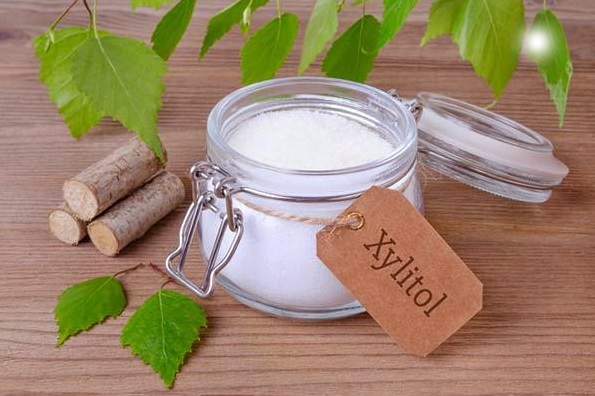Doctors From Chicago Discover That Xylitol Can Be Used as an Adjunct Therapy for Melanoma
Nikhil Prasad Fact checked by:Thailand Medical News Team Jan 21, 2025 2 months, 3 weeks, 2 days, 9 hours, 17 minutes ago
Medical News: Cancer continues to claim lives worldwide, being the second leading cause of death in the United States. Innovations in treatment have been significant, yet affordability remains a challenge for many. A natural sugar alcohol called xylitol, widely recognized for its dental health benefits, has gained attention for its potential anti-cancer properties. Researchers from Northwestern University and Ann & Robert H. Lurie Children’s Hospital of Chicago undertook an in-depth study to explore xylitol's effects on tumor progression in mouse cancer models.
 Doctors From Chicago Discover That Xylitol Can Be Used as an Adjunct Therapy for Melanoma
Doctors From Chicago Discover That Xylitol Can Be Used as an Adjunct Therapy for Melanoma
This
Medical News report sheds light on the groundbreaking experiments conducted on two types of cancer in mice: B16F10 melanoma and 4T1 mammary carcinoma. These trials aimed to determine xylitol's influence on tumor development, its mechanisms of action, and its possible future as a cost-effective cancer therapy.
Key Study Methods and Objectives
The study involved two groups of immunocompetent female mice: BALB/c mice injected with 4T1 mammary carcinoma cells and C57BL/6 mice injected with B16F10 melanoma cells. Researchers used a high-concentration (20%) xylitol solution, administered intratumorally and peritumorally over several days. Tumor volumes, metabolic changes, and tissue samples were meticulously analyzed using advanced techniques like metabolomics and histopathology.
The goal was to understand xylitol’s effects on tumor metabolism, angiogenesis, and immune response. Previous research suggested that xylitol might inhibit cancer growth by disrupting metabolic pathways essential for tumor development.
Findings: A Closer Look at Xylitol’s Impact on Tumors
-Melanoma Model Success
In mice with B16F10 melanoma, xylitol injections led to a significant reduction in tumor size - up to 40% within five days. Metabolomic analysis revealed notable changes in tumor metabolism, including reduced production of glutathione, ATP, and histamine. These changes likely increased oxidative stress within tumor cells, impairing their growth and survival.
Challenges with Mammary Carcinoma
Conversely, the 4T1 mammary carcinoma model showed no significant tumor reduction following xylitol treatment. The study attributed this difference to the structural characteristics of the tumors. The firmer mammary tumors prevented effective xylitol distribution, in contrast to the softer melanoma tumors, which allowed better absorption.
Metabolomic Insights
Metabolomics revealed that xylitol accumulated in tumor cells, suggesting a direct metabolic impact. Tumor cells treated with xylitol exhibited reduced levels of energy-related molecules, such as citrate and pyruvic acid, indicating metabolic stress. The suppression of glutathione production was particularly significant, as this antioxidant plays a cru
cial role in protecting cancer cells from oxidative damage. By lowering glutathione levels, xylitol enhanced the susceptibility of cancer cells to reactive oxygen species, a key weapon of the immune system.
Broader Implications of the Study
The study also highlighted the role of tumor stroma integrity in treatment effectiveness. In the melanoma model, repeated xylitol injections led to stroma degradation, causing leakage of the solution and limiting its sustained efficacy.
This finding underscores the need for innovative drug delivery systems, such as osmotic pumps or hydrogels, to enhance treatment precision and consistency.
Additionally, the researchers noted the potential influence of xylitol on tumor-specific microbiomes. Although this study focused on direct tumor injections, xylitol’s known ability to alter gut microbiota composition opens new avenues for exploring its systemic effects on cancer progression.
Conclusions and Future Directions
This pioneering research demonstrates xylitol’s promising role as an adjunct therapy for melanoma. Its ability to modulate tumor metabolism, reduce vascularization, and enhance oxidative stress in cancer cells represents a significant breakthrough. However, the study also emphasizes the complexity of cancer biology and the need for tailored approaches based on tumor type and characteristics.
The differential outcomes between the melanoma and mammary carcinoma models highlight the importance of delivery methods and tumor-specific properties. Future research should focus on refining xylitol administration techniques, exploring its effects in combination with other treatments, and extending findings to human clinical trials. This work paves the way for developing affordable and accessible cancer therapies, potentially transforming patient care worldwide.
The study findings were published in the peer-reviewed journal: Nutraceuticals.
https://www.mdpi.com/1661-3821/5/1/4
For the latest Cancer News, keep on logging to Thailand
Medical News.
Read Also:
https://www.thailandmedical.news/news/phytochemical-found-in-olive-oil-shows-promise-against-melanoma
https://www.thailandmedical.news/news/curcumin-and-thymoquinone-team-up-against-melanoma
https://www.thailandmedical.news/news/thailand-led-medical-study-finds-that-malabar-spinach-shows-promise-in-preventing-skin-disorders-including-melanoma
https://www.thailandmedical.news/news/rising-incidence-of-thin-melanoma-in-norway-raises-alarm
https://www.thailandmedical.news/news/covid-19-research-american-led-study-shows-that-nasal-sprays-with-xylitol-and-iota-carrageenan-might-help-protect-against-covid-19
https://www.thailandmedical.news/news/study-shows-potential-of-combining-iota-carrageenan-and-xylitol-as-a-potential-prophylactic-nasal-spray-for-covid-19
